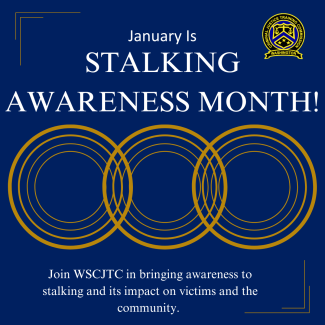WATCH THE VIDEO ON SEATTLE ARC
January is Stalking Awareness Month, a time to bring attention to a crime that impacts millions yet often remains hidden. The observance began in 2003, inspired by Debbie Riddle’s advocacy following the tragic murder of her sister, Peggy Klinke, by a stalker. Debbie’s mission to turn her family’s loss into a catalyst for change has led to improved law enforcement responses to stalking and increased support for survivors.
At the Washington State Criminal Justice Training Commission (WSCJTC), we are committed to advancing this cause by providing comprehensive training that equips officers with the skills to recognize, assess, and respond effectively to stalking cases.
National Day of Action: #SparkleAgainstStalking
On January 18, 2025, we observe the National Day of Action for Stalking Awareness, commemorating the anniversary of Peggy Klinke’s death. To honor her memory and raise awareness, individuals and organizations are encouraged to participate by wearing something sparkly and sharing photos on social media with the hashtag #SparkleAgainstStalking. The sparkle symbolizes hope and acknowledgment, bringing light to survivors and their experiences.
Visit the Stalking Prevention, Awareness, and Resource Center (SPARC) for more information and resources on the National Day of Action.

Understanding Stalking and Its Impact
Stalking is defined as behavior directed at a specific person that would cause a reasonable person to fear for their safety or suffer emotional distress. In Washington, stalking is legally defined under RCW 9A.46.110 and includes behaviors such as repeated unwanted contact, surveillance, or harassment that disrupts the victim’s life. Cyber harassment is also recognized under this statute.
Key Statistics:
- 1 in 3 women and 1 in 6 men experience stalking in their lifetime.
- Over 50% of victims are stalked before the age of 25.
- 40% of stalkers are intimate partners, while 42% are acquaintances.
- Stalking most frequently impacts individuals aged 18 to 24.
- Despite its prevalence, stalking is underreported; in 2019, only 29% of victims filed police reports.
- When protection orders were obtained, stalkers violated them 69% of the time for female victims and 81% for male victims.
- 76% of femicide victims were stalked first (NCADV).
Violence against women follows predictable patterns, with stalking often serving as a sign of imminent lethality. Tools like the Lethality Assessment Protocol (LAP) and Danger Assessment Tool (DA-LE) developed by Futures Without Violence underscore the critical link between stalking and femicide. Recognizing this connection is essential for understanding the gravity of stalking as a crime.
WSCJTC’s Commitment to Training and Prevention
To address the severity of stalking and improve outcomes for victims, WSCJTC integrates stalking education into its Gender-Related Crimes (GRC) program. Our goal is to prepare law enforcement professionals to handle stalking cases with the necessary knowledge, skills, and empathy.
Our Two-Part Curriculum Includes:
Course 1: Fundamentals of Stalking – Provides foundational knowledge on recognizing stalking behaviors, trauma-informed responses, and understanding victim impact.
Course 2A: Stalking Investigations and Report Writing – Focuses on advanced investigative techniques, risk assessments, and effective multi-agency collaboration to build strong cases.
Course 2B: A Realistic Stalking Simulation – The simulation offers officers a unique, immersive experience that bridges the gap between theoretical knowledge and practical application. With this hands-on training, we enhance officers' educational experiences while fostering critical thinking and decision-making skills in a safe environment.
By incorporating these components, we aim to equip officers with tools to recognize and intervene effectively before violence escalates. Highlighting the patterns of stalking and its connection to severe outcomes like femicide allows law enforcement to take proactive measures to protect victims.
Why It Matters
Victims of stalking often endure long-term emotional distress, and without early intervention, stalking can escalate to severe violence. By enhancing officer training and raising awareness, we can help break the cycle of stalking, ensuring victims receive the protection and support they deserve.
At WSCJTC, we believe that training the Guardians of Democracy means addressing crimes like stalking head-on. Through continuous education and public engagement, we stand with victims and work to build safer communities across Washington.
Visit WSCJTC's website for more information about our stalking training programs or to get involved in Stalking Awareness Month initiatives.
